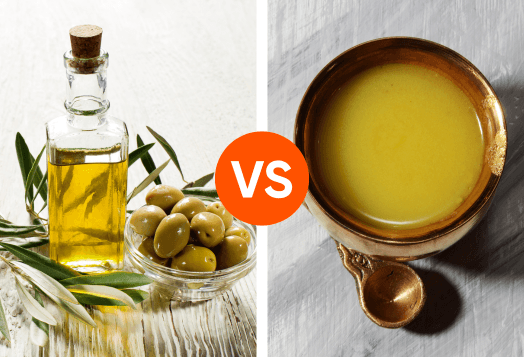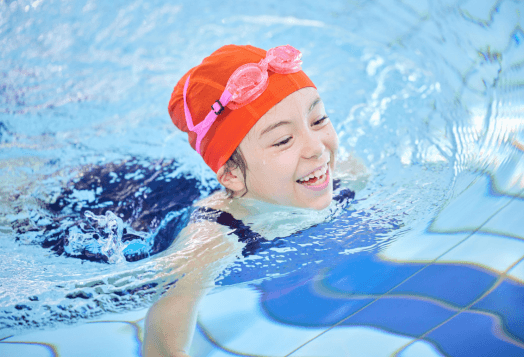
If your child loves bath-time splashes but freezes near a pool, this guide is for you. Learning to swim is more than just a fun summer activity; it's a life skill. The benefits of swimming for kids go far beyond the water. Still wondering about the best age to learn swimming, or whether your child is at the right age to learn swimming? Don’t worry, those questions are totally answerable. Let’s break it down.
Benefits of Swimming for Kids That Go Beyond the Pool
Swimming offers kids far more than just a way to stay afloat. It’s a chance to grow stronger, more confident, and socially engaged. And if you’re still wondering when the right age to learn swimming is, you’re not alone; every child starts at their own pace.
1. Physical Benefits
Swimming for kids builds more than just water confidence; it strengthens the heart, boosts stamina, and improves coordination in a fun, natural way, offering numerous benefits of swimming. As they master different strokes, children develop full-body strength. Plus, it's a low-impact sport that supports growing joints, making it ideal for active (and not-so-active) kids alike.
2. Mental & Emotional Benefits
Another benefit of swimming for kids is that there’s a calming rhythm to swimming that helps kids focus, sharpen their memory, and feel proud of their progress. Whether your child is just starting out or already comfortable in the pool, swimming encourages independence and offers gentle stress relief. Yes, even little ones need that.
3. Social Benefits
From learning to take turns to cheering each other on, swimming lessons offer important social skill-building moments. It’s a space where shy kids gradually find their voice and more outgoing ones learn patience and teamwork. The result? Stronger swimmers and even stronger social confidence.
Research shows that swimming also supports cognitive development, especially when started early. That’s why many experts recommend introducing swimming for kids at a young age. It sharpens memory, focus, and problem-solving skills, all while they’re having fun in the water.
Best Age to Learn Swimming for Kids According to Experts
There’s no “perfect” age, but there is a right age to learn swimming for every child based on their development, coordination, and confidence. Understanding these stages helps you support your child’s swimming journey more effectively.
1. Ages 6 Months–3 Years
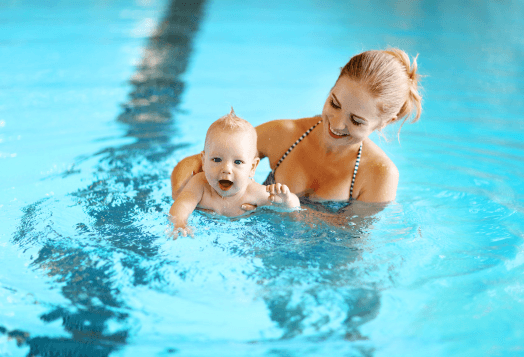
This stage focuses on helping little ones feel secure in the water through gentle splashing, floating, and playful bonding. Kids can start swim lessons as early as age 1 to build water familiarity and add a layer of drowning protection while also teaching parents essential safety skills,just one of the many benefits of swimming for kids..
2. Ages 4–5 Years
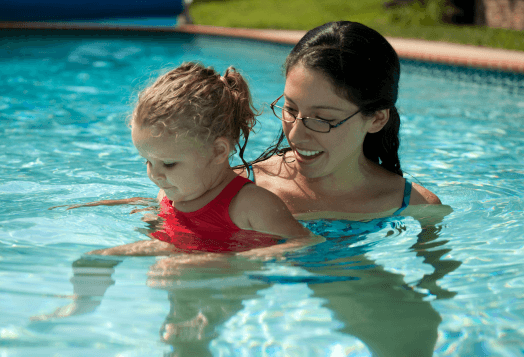
Older children are often at the best age to learn swimming efficiently. At this stage, older kids are ready to fine-tune their technique, improve breathing, and set swimming goals. With better focus and coordination, they can strengthen their skills and build endurance. From swimming full pool lengths to mastering strokes like front crawl and backstroke, this phase is all about refining form and boosting confidence in the water.
3. Ages 6+ Years
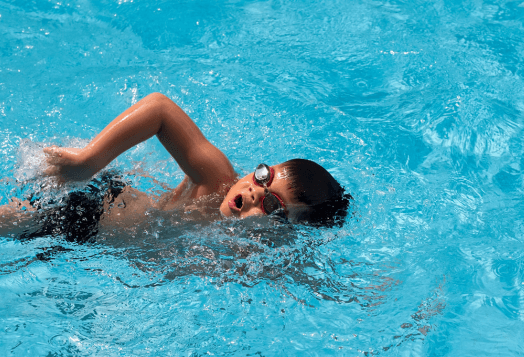
Once children reach the right age to learn swimming with structure, they can go beyond basics At this stage, kids are ready to go beyond basics, developing stronger strokes, better breath control, and swimming longer distances. They gain confidence through measurable progress like mastering front crawl, backstroke, or swimming full laps. It’s all about fine-tuning technique and boosting stamina.
Choosing the Right Swimming Lessons for Kids at Every Age
Finding the best swimming lessons for kids isn’t just about flashy facilities or costs; it's about matching your child’s needs with an instructor and environment that prioritises comfort, safety, and fun.
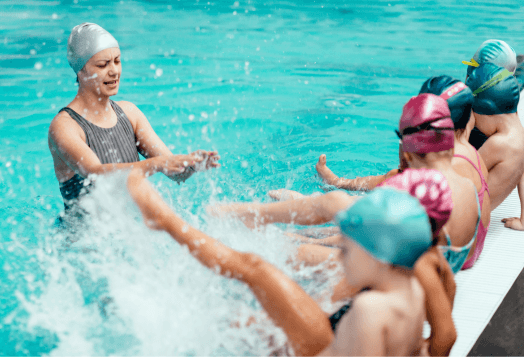
1. Look for the Right Instructor
Certified instructors or reputable swimming schools with experience in teaching swimming for kids and different types of swimming techniques should be your first priority. Ask if the programme includes water safety training before diving into strokes. Instructors who are patient, playful, and trained to work with young kids often make the biggest impact.
2. Match Lesson Style to Your Child’s Personality
Every child learns differently, so finding the right swimming lessons for kids depends on their personality and comfort level. If your child enjoys social settings, group lessons can make learning feel like fun. For kids who are more reserved or need extra attention, private or small-group sessions can offer a gentler, more personalised pace. And if your little one is anxious around water, starting with a parent-and-child class or letting them simply observe a few sessions can help them ease in at their own rhythm.
3. Prioritise the Right Environment
The right age to learn swimming is also the right time to build positive associations with water. A warm pool and a welcoming atmosphere can go a long way in easing first-time nerves. Notice how instructors provide feedback: do they encourage through praise rather than pressure? The best swimming programmes for kids weave play into the learning process, making progress feel like part of the fun.
Why Swimming for Kids Begins at Home Before Lessons Do
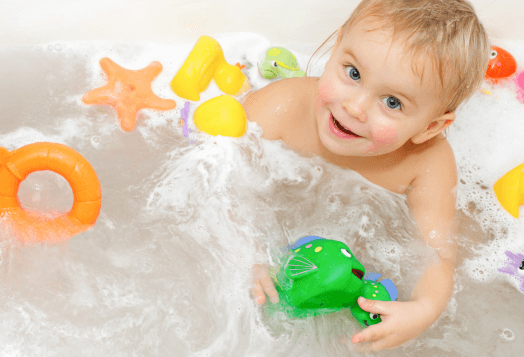
Even before enrolling in formal swimming lessons for kids, you can start building essential water confidence right at home.
1. Start with Water Confidence
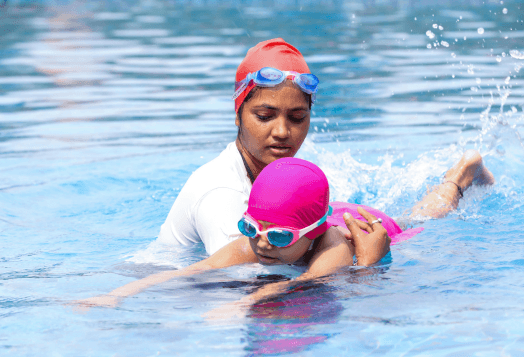
The bath is your first classroom. Encourage playful interactions like blowing bubbles, pouring water gently over their head, or floating toys. Each moment helps your child feel comfortable in water. Celebrate the small wins “You got your ears wet today, amazing!” to build excitement and trust.
2. Use Floatation Devices the Smart Way
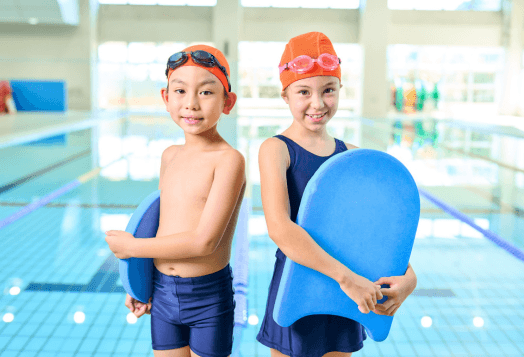
Not all floatation aids serve the same purpose. Life jackets are a must for open water safety, while floaties and kickboards are great for practising basic swimming skills. Always choose gear that fits properly and supports learning, not something they grow dependent on.
3. Keep It Playful
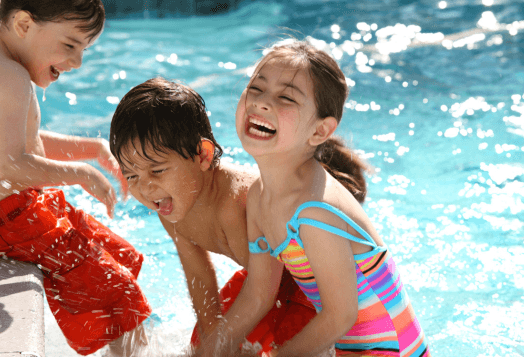
Turn skill-building into a game. “Fetch the toy,” “Simon Says,” or “biggest splash” are all fun ways to improve comfort and coordination. Blowing bubbles builds breath control, kicking games strengthen legs, and laughter keeps kids coming back.
Remember, confidence in water starts long before the pool. Make early experiences joyful, and you’ll set the stage for swimming success.
Essential Water Safety for Kids Learning to Swim
Because fun in the water should never come at the cost of safety.
1. Constant Supervision is Non-Negotiable:
While swim lessons are a crucial layer of protection, they do not make a child "drown-proof." Always stay within arm’s reach of young children, especially those under five.
Avoid distractions like phones or chores. When your child is in or near water, your full attention belongs there.
2. Individual Readiness:
Every child is different. Pay attention to your child's emotional maturity and comfort level in the water. If they show fear, a gentle, fun-focused approach is more effective than pushing them too hard.
3. Qualified Instructors:
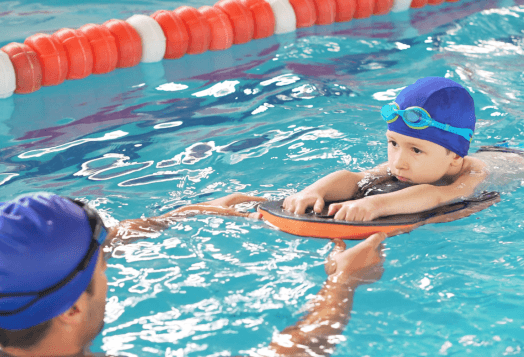
Look for programs with experienced, qualified instructors who are certified through a nationally recognised curriculum and have a focus on safety.
4. Use the Right Safety Equipment
For home pools, always install physical barriers like fences, safety covers, and pool alarms to prevent unsupervised access. In open water, ensure your child wears a properly fitted, Coast Guard approved life jacket, no exceptions. Avoid relying on inflatable toys or floaties for safety, as they’re prone to flipping and not designed for protection.
5. Teach Pool Rules Early
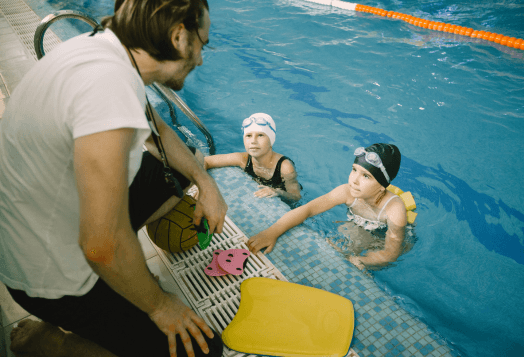
Establish and reinforce basic pool rules like no running near the pool, no diving in shallow areas, and no pushing or roughhousing. Teach your child to always wait for an adult before entering the water and to know where the lifeguard is at all times.
6. Learn CPR, It Could Save a Life
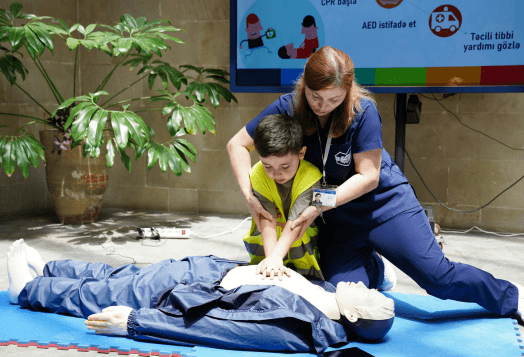
Knowing CPR is one of the most empowering skills a parent or caregiver can have.
Many swim schools offer CPR training consider bundling it with your child’s swimming lessons for added preparedness.
A Confident Splash into the Future
Swimming is more than a sport; it's a lifelong skill that builds confidence, coordination, and safety from an early age. Whether your child is just beginning to explore the water or is ready to master new strokes, every splash is a step forward.
Start slow, make it fun, and remember there’s no one “right age to learn swimming,” only the pace that suits your child best. If you're looking to begin, Pyng’s swimming coaches help parents find expert-led swimming lessons for kids that blend safety, skill-building, and joy. Because when it comes to swimming for kids, progress starts with trust, play, and the right guidance.


